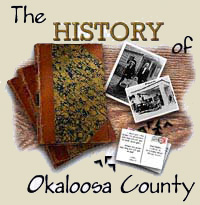Okaloosa County Online Gallery
Welcome to the Okaloosa County scrapbook. We hope you enjoy looking back at our fascinating and rich past.
Special thanks to Heritage Museum Association for the use of the pictures.
All historic photographs in this presentation are copyright © Heritage Museum Association and may not be used or reproduced in any form without written consent.
For more information please contact Heritage Museum Association,
115 Westview Avenue, Valparaiso, Florida
(850)678-2615
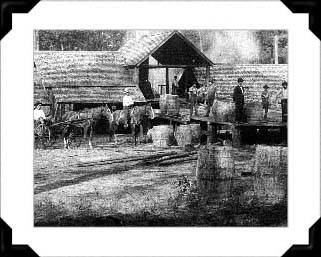
Okaloosa County has a diversified agricultural history. Cotton was still king in the Baker area well into the 1920's. Others specialized in blueberries, peanuts, tung oil production, livestock, vineyards, cork trees and pecans. At one time the County was billed as the "tung oil capitol of America." Lumber and its allied industry, turpentine, were major industries well into the 1930's. The Duggan Lumber Company had 14 sawmills in the Laurel Hill area.

Dan Lundy's 8-foot stalks of cayana sugar cane were considered unique. The Shalimar Vineyards were established to develop the grape industry in Northwest Florida. For a time, the Shalimar Winery produced a high quality wine.
At that time, commercial fishing in Destin and Niceville was a marginal industry, basically a family enterprise.
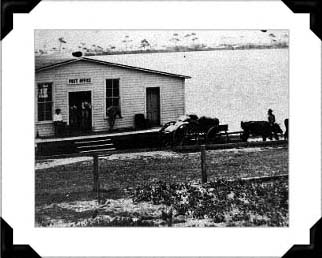
In 1928, there were 90 residents in Niceville, 50 in Valparaiso, and 30 in Camp Walton. Gas cost 15 cents a gallon, sturgeon was 16 cents a pound, red snapper 9 cents a pound, and shrimp 13 cents a pound at the local trade store.
Also, during the late 1920's subscription rates for the newspaper were $1 per year. Produce could be exchanged for subscriptions at 10 cents per pound for pecans, $3.50 for a cord of wood, and $1.00 for a bushel of peanuts. In the mid-1930's, the "News Journal" was bought by young Robert F. Sikes, a man with clear political ambitions, and the "He Coon" of Northwest Florida politics.
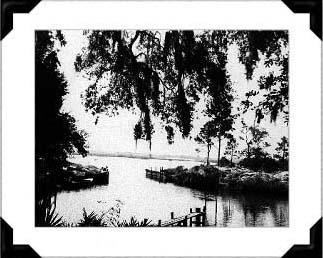
In the mid-1930's, a frontier-like County existed. Bootlegging was a bothersome problem. The Destin East Pass became a major avenue for smuggling of illicit rum and whiskey. As a result, the Sunday Blue Law closed all legal businesses on Sunday. Drug stores were allowed to sell soft drinks and ice cream. There was to be no further temptation, however, and music was expressly forbidden in these businesses on Sunday. Needless to say, the Blue Law was an act of futility.
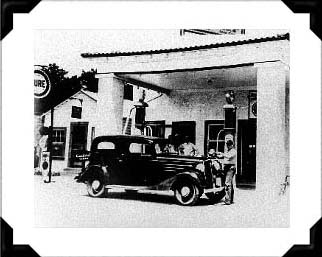
In the late 1940's and early 1950's, wide-open gambling in the County attracted statewide attention until public outcry and intervention by Governor Fuller Warren. In Ft. Walton, Robert's Drug Store served as a kind of community center and had the town's single telephone. The favorite gambling places were the Shalimar Club and the Magnolia Club.
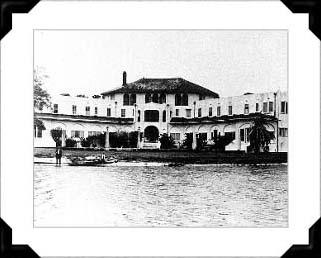
The development of the tourist industry was made possible by the post World War II prosperity and the continued growth of Eglin AFB. Eglin Air Force Base is the County's preeminent industry as the free world's largest U.S. air base, and its history is connected to Valparaiso, founded by Chicago promoter Frank Perrine in 1919.
In 1922, James Plew purchased Mr. Perrine's development company's assets. Mr. Plew was a versatile individual, having worked his way through business and medical college simultaneously in 1885. He became an ardent admirer of aviation and owned the first airplane in Chicago before 1910. He built the Valparaiso Inn as a vacation spot for his wealthy Chicago friends. Pilots from Air Corps Tactical School at Maxwell Field in Alabama were frequent guests.
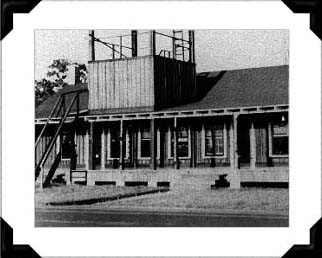
Lt. Arnold Rich recognized the area's potential as an air base site. Lt. Rich suggested James Plew furnish land for a landing field. Plew's interest was based on his keen aviation ideas and desire for a regular Army payroll for the area. Following its activation as a bus-post of Maxwell Field in 1937, it was said malcontents assigned to duty at Valparaiso were given the choice of "KP, MP, or VAL-P."
The field was designed as an independent post in 1940, and as the Air Corps' proving ground in 1941. The raid on Tokyo and other Japanese cities by Hurlburt Field's Doolittle Raiders in 1942 served to boost American morale. In 1944, U.S. Congressional Representative Robert F. Sikes notified Eglin that Congress had allocated funding for a climatic hangar, a project Sikes viewed as insuring its permanency. Eglin was also the site of the movie, "12 O'Clock High" starring Gregory Peck.
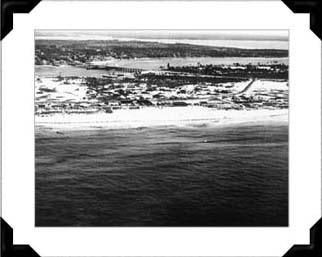
Okaloosa County acquired 3-miles of Santa Rosa Island in 1950. The acquisition of Okaloosa Island culminated the efforts of U.S. Representative Robert F. Sikes, who introduced the bill authorizing the transfer. The community of Destin, the world's luckiest little fishing village, was founded by Captain Leonard Destin in 1845. It adopted the ways of its New England founder.
The creation of Destin's East Pass is one of the County's great stories. Mr. O.T. Melvin was one of the four men responsible for the freak occurrence. Heavy rains had built up pressure in the bay, at which time it was higher than the Gulf. The four men attempted to dig a small trench from the Gulf to the bay with shovels. The pressure-driven waters literally exploded through the small breach. The flood leveled a forest in the process. The old Pass, located further east, completely closed with silt within three years. Today, the Destin East Pass is maintained by periodic dredging. Mr. Melvin later regretted the changes that had occurred.
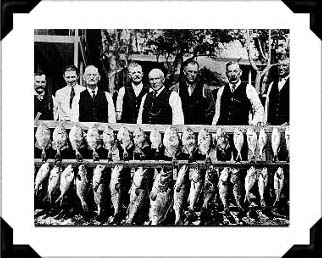
In 1931, the Port Dixie Harbor and Terminal Company planned facilities for a shipbuilding plant, railroad, port facilities, steamship lines, rubber tire plant, night club and town site on Garnier's Bayou.
The Corps of Engineers decided plans to dredge the Destin East Pass to accommodate deep-water vessels was not feasible. In the 1920's, mullet sold for as little as a penny per pound. While commercial fishing is important in the Niceville area, the charter boat business has dominated since World War II. The shift was accelerated by the first Destin Fishing Rodeo in 1949.
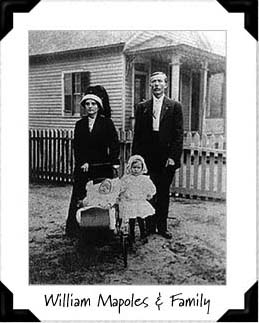
The father of Okaloosa County was the colorful and controversial William Mapoles, a State Representative for Walton County. The geographic isolation of the area ignited the desire for a separate county.
Mr. Mapoles introduced the first bill to create the new county in 1913. The proposed name was Yellow River County, later changed to Wilson County, Woodrow Wilson being President at the time. In 1915, Okaloosa County was created and name by Mr Mapoles after a river steamboat that traveled from Milton to Pensacola.
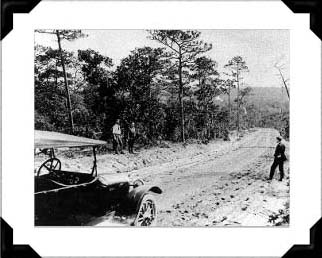
Okaloosa County was founded by special election on September 7, 1915. The new County had to face many problems right from the start, not the least of which was the fact that not one single mile of paved road existed in the County. There was a hot rivalry among Milligan, Laurel Hill, Baker and Crestview for the honor of being chosen permanent County seat. Crestview was chosen in April of 1917 as the County seat.
The immediate concern for good roads led to the formation of "Good Roads Clubs" in Crestview and Camp Walton. Only by working together can we maintain and improve upon the unique quality of Okaloosa County life. The Board of County Commissioners is striving to anticipate both the challenges and promises of the future.

In 1931, the Port Dixie Harbor and Terminal Company planned facilities for a shipbuilding plant, railroad, port facilities, steamship lines, rubber tire plant, night club and town site on Garnier's Bayou.
The Corps of Engineers decided plans to dredge the Destin East Pass to accommodate deep-water vessels was not feasible. In the 1920's, mullet sold for as little as a penny per pound. While commercial fishing is important in the Niceville area, the charter boat business has dominated since World War II. The shift was accelerated by the first Destin Fishing Rodeo in 1949.

